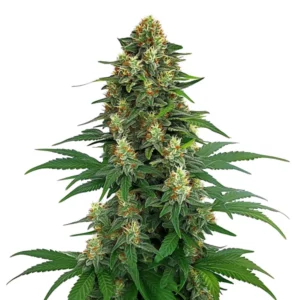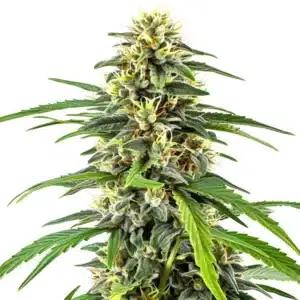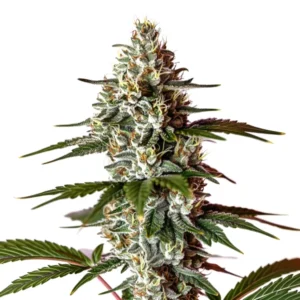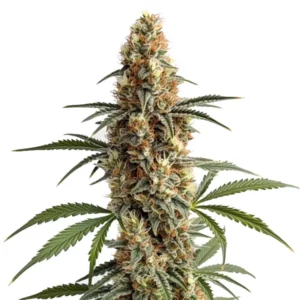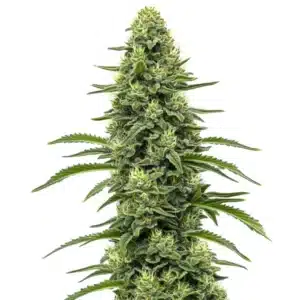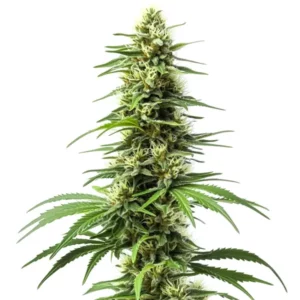
Importance of Nitrate Reductase in Plants
The importance of nitrate reductase in plants is evident in their overall growth and productivity, especially for those investing time in cultivating cannabis. This enzyme is pivotal in converting nitrates into nitrites, a process essential for protein formation. Without this conversion, plants would struggle to thrive, impacting yield and quality.
In the world of cannabis growing, knowing the impact of nitrate reductase on plant metabolism is crucial. The enzyme helps in assimilating nitrogen, a key nutrient for plant development. For both novice and seasoned growers, ensuring that your plants have optimal nitrate reductase activity can lead to healthier, more robust growth.
Recommended Strains
Tangie
|
|
THC | 19% - 22% (Medium) |
|
|
Type | Feminized |
|
|
Yield | High |
|
|
Phenotype | 30% Indica / 70% Sativa |
Amnesia Haze
|
|
THC | 18% - 22% (Medium) |
|
|
Type | Feminized |
|
|
Yield | High |
|
|
Phenotype | 30% Indica / 70% Sativa |
As you browse through seeds such as the GG4 from Blimburn Seeds, knowing the significance of nitrate reductase in plant development can aid in making informed decisions. This knowledge not only enhances growth but also maximizes the potential of each strain, ensuring that your garden flourishes.
Role of Nitrate Reductase in Plant Growth
The role of nitrate reductase in plant growth cannot be overstated. It is the gateway through which plants utilize nitrogen, an essential building block for proteins and nucleic acids. In simple terms, it helps plants convert nutrients into usable forms, promoting healthy growth.
For cannabis enthusiasts, strains like Blue Dream from Blimburn Seeds benefit greatly from efficient nitrate reductase activity. This not only ensures better nutrition but also enhances the plant’s ability to resist stress. A well-fed plant is a strong plant, capable of producing superior quality buds.
Knowing the importance of nitrate reductase in plants allows growers to fine-tune their cultivation techniques. By optimizing conditions for the enzyme’s activity, growers can ensure their plants receive the nutrients necessary for vigorous growth. This results in not only increased yield but also improved resilience to pests and diseases.
Furthermore, nitrate reductase enzyme function in plants is vital for maintaining the delicate balance of nutrients within the soil. When plants efficiently convert nitrates, the soil retains its fertility, supporting sustainable growing practices. This ecological balance is important for long-term agricultural success, benefiting both the plants and the environment.
Boosting Growth with Nitrate Reductase
Nitrate reductase enzyme function in plants is akin to a powerhouse. By converting nitrates into nitrites, it sets off a chain reaction of nutrient absorption and utilization. This process is fundamental in ensuring plants reach their full growth potential.
Consider the critical impact of nitrate reductase on plant metabolism. It influences how efficiently a plant can photosynthesize and grow. For example, the renowned Amnesia Haze strain from Blimburn Seeds can achieve remarkable growth when nitrate reductase activity is optimal.
Ensuring active nitrate reductase can be the difference between a good harvest and a great one. Plants with robust enzyme activity grow faster, develop stronger structures, and exhibit improved overall health. This is particularly beneficial for high-demand cannabis strains that require intensive nutrient management.
Besides to boosting growth, the enzyme plays a crucial role in reducing the plant’s susceptibility to environmental stressors. With active nitrate reductase, plants can better manage adverse conditions such as drought or nutrient-poor soils, leading to more sustainable and resilient cultivation practices.
Promos & Deals
Nitrate Reductase Activity in Plant Nutrition
Plant nutrition hinges significantly on nitrate reductase activity. This enzyme is responsible for breaking down nitrates, which are then used to create amino acids and proteins. These compounds are vital for plant structure and function.
For cannabis growers, ensuring that your plant’s nitrate reductase is functioning well can lead to a bountiful harvest. Strains like the potent Tangie from Blimburn Seeds thrive with the right balance of nutrients, facilitated by active nitrate reductase.
The importance of nitrate reductase in plants extends to its role in maximizing nutrient uptake. By efficiently processing nitrates, plants can absorb and utilize other essential minerals more effectively, promoting comprehensive nutrition and growth.
Moreover, nitrate reductase activity in plant nutrition helps maintain soil health. Active enzymes prevent the buildup of excess nitrates, reducing potential environmental damage and ensuring a sustainable growing environment that supports plant health and productivity over time.

Enhancing Plant Development
The significance of nitrate reductase in plant development is apparent in its ability to aid in cell growth and division. This enzyme ensures that plants have the necessary components to expand and strengthen their structures.
Efficient nitrate reductase activity leads to better photosynthesis, enabling plants to convert sunlight into energy more effectively. This process is particularly crucial for indoor cannabis growers who rely on artificial lighting.
By optimizing the role of nitrate reductase in plant growth, growers can achieve more robust and uniform plant development. This uniformity is essential for maintaining consistent quality across harvests, especially when cultivating premium cannabis strains.
Additionally, the enzyme’s function in managing environmental stress responses is invaluable. Plants with active nitrate reductase are more adaptable to varying conditions, allowing them to maintain growth even in less-than-ideal situations. This adaptability is a key factor in successful and sustainable cultivation practices.
Practical Tips for Cannabis Growers
For both first-time and experienced growers, knowing how to manage nitrate reductase activity can make a significant difference. Here are some practical tips to ensure your plants benefit from active nitrate reductase:
- Regularly test soil and water for nitrate levels to ensure your plants are getting the right amount of nutrients.
- Consider using fertilizers that support nitrate reductase activity, particularly those with a balanced nitrogen content.
- Monitor your plants for signs of nutrient deficiency, such as yellowing leaves or stunted growth.
- Ensure your growing environment is optimal for enzyme activity, including maintaining the right temperature and humidity levels.
By paying attention to these factors, you can maximize the efficiency of nitrate reductase, leading to healthier and more productive plants.
Incorporating these strategies into your growing routine not only enhances the impact of nitrate reductase on plant metabolism but also improves overall plant health. By maintaining optimal enzyme conditions, you ensure that your cannabis plants can reach their full potential.
Moreover, knowing the significance of nitrate reductase in plant development allows growers to make informed decisions about strain selection and cultivation practices. This knowledge, paired with practical application, can significantly boost the quality and yield of your crops.

FAQs
What is nitrate reductase and why is it important for cannabis growth?
Nitrate reductase is an enzyme that converts nitrates into nitrites, essential for plant growth and development. It plays a crucial role in how plants use nitrogen, which is vital for creating proteins and other necessary compounds. For cannabis growth, efficient nitrate reductase activity means better nutrient absorption and healthier plants.
Without nitrate reductase, plants would struggle to process the nutrients they need, leading to poor growth and reduced yields. Whether you’re growing indoors or outdoors, ensuring your cannabis plants have active nitrate reductase can improve their overall health and productivity.
The importance of nitrate reductase in plants is evident in its ability to enhance nutrient conversion, ensuring that plants receive adequate nutrition for optimal growth. This enzyme is a cornerstone in achieving vibrant and resilient cannabis plants, underscoring its value in any cultivation setup.
Furthermore, the enzyme’s activity is closely tied to the overall vigor of the plant. By supporting robust growth and development, nitrate reductase helps growers achieve higher-quality harvests, making it an indispensable component of successful cannabis cultivation.
How does nitrate reductase affect plant metabolism?
The impact of nitrate reductase on plant metabolism is significant. This enzyme facilitates the initial step in nitrogen assimilation, which is critical for the production of amino acids and proteins. These compounds are integral to the plant’s metabolic processes, influencing growth and energy production.
For cannabis growers, understanding this relationship can aid in optimizing nutrient management. Strains that metabolize efficiently tend to grow faster and produce higher yields, making nitrate reductase activity a key focus for successful cultivation.
By enhancing nitrate reductase enzyme function in plants, growers can improve the efficiency of photosynthesis and energy production. This not only boosts plant growth but also enhances the quality of the final product, delivering more potent and flavorful cannabis.
Additionally, active nitrate reductase helps mitigate the effects of environmental stress on plant metabolism. By supporting the plant’s intrinsic metabolic processes, this enzyme ensures that cannabis plants remain healthy and productive, even under challenging conditions.
Can I enhance nitrate reductase activity in my cannabis plants?
Yes, there are several ways to enhance nitrate reductase activity in cannabis plants. Ensuring a balanced supply of nutrients, particularly nitrogen, is crucial. Using fertilizers designed to support enzyme activity can also be beneficial. Additionally, maintaining optimal growing conditions, such as the right temperature and pH levels, can boost enzyme efficiency.
By focusing on these areas, you can enhance the overall health and yield of your cannabis plants. Strains like GG4 and Blue Dream from Blimburn Seeds can particularly benefit from improved nitrate reductase activity, resulting in robust and resilient plants.
Implementing strategies to boost nitrate reductase activity not only enhances plant growth but also increases resilience to stressors. This adaptability ensures that your cannabis plants can thrive in various growing conditions, maximizing their genetic potential.
Furthermore, understanding the role of nitrate reductase in plant growth facilitates better cultivation practices. By aligning your growing techniques with the enzyme’s needs, you can achieve superior outcomes, both in terms of plant health and harvest quality.
What symptoms might indicate low nitrate reductase activity?
Plants with low nitrate reductase activity often exhibit signs of nutrient deficiency, such as yellowing leaves (chlorosis) and stunted growth. These symptoms occur because the plant cannot effectively assimilate nitrogen, leading to poor protein synthesis.
For cannabis growers, monitoring these symptoms is crucial. If you notice these signs, it might be time to test your soil and adjust your nutrient regimen. Addressing these issues promptly can help restore plant health and improve growth outcomes.
Recognizing the significance of nitrate reductase in plant development is key to preventing and managing deficiencies. By maintaining active enzyme levels, growers can ensure that their plants remain healthy and vigorous throughout the growth cycle.
Additionally, early detection and correction of low nitrate reductase activity can prevent long-term damage to the plant. By acting swiftly, growers can maintain optimal growth conditions, safeguarding their investment and ensuring a successful harvest.
How does nitrate reductase influence cannabis strain selection?
Nitrate reductase activity can influence how well different cannabis strains perform in specific growing conditions. Strains that require high nitrogen levels might need more active nitrate reductase to thrive. When selecting seeds, consider factors like your growing environment and nutrient availability.
For instance, strains such as Amnesia Haze and Tangie from Blimburn Seeds may require specific nutrient management practices to maximize their growth potential. Knowing the enzyme’s role can guide you in choosing the right strains for your setup, ensuring a successful cultivation experience.
The impact of nitrate reductase on plant metabolism also affects the adaptability of different strains. By selecting strains with optimal enzyme activity, growers can ensure that their plants are well-suited to the available environmental and nutrient conditions.
Moreover, the enzyme’s role in nutrient management is a critical factor in achieving consistent quality across different strains. By knowing the importance of nitrate reductase in plants, growers can make more informed decisions, leading to better outcomes in terms of yield and product quality.


